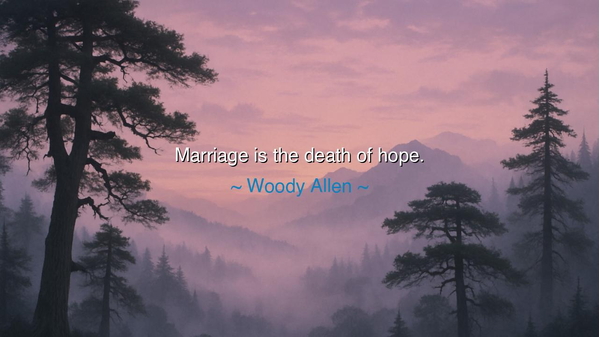
Marriage is the death of hope.






“Marriage is the death of hope.” Thus declared Woody Allen, a man whose words, though laced with irony, pierce into the heart of human longing. His statement, at first, sounds cruel—a jest carved from cynicism. Yet beneath its laughter lies a shadow of truth, a whisper of disillusionment born not of hatred, but of deep observation. In this phrase, Allen exposes a paradox as old as love itself: that marriage, the union built upon the highest of dreams, can sometimes become the tomb of the very hope that once gave it life.
To understand this saying, one must not take it as mockery alone, but as a lamentation—a reflection on the frailty of human expectation. When a man and a woman come together, they are carried by the bright wind of hope: hope for eternal love, for harmony, for a future unmarred by loneliness. Yet the moment vows are spoken and the dream is made flesh, the illusion begins to tremble. The hope that once soared in imagination must now walk upon the earth, bound by daily rituals, misunderstandings, and the quiet erosion of mystery. The fire of promise is tested against the cold stone of reality. Thus, in Allen’s words, marriage does not slay love itself, but the idealized hope that love would remain untouched by time.
In the ancient world, poets and philosophers often spoke of this transformation. Sophocles warned that the gods envy the happiness of men because they know how fragile it is. To hope for perfect love, unending passion, or perpetual joy is to challenge the order of the cosmos. The Greeks called this hubris, the arrogance of mortals who dream of perfection. And so, when the dream of marriage meets the reality of human imperfection, it is not love that dies, but the illusion that love alone can fulfill every hunger of the heart. In that death, one finds either despair—or wisdom.
History offers countless mirrors to this truth. Think of Napoleon Bonaparte and Josephine—a union born of flame, undone by ambition and betrayal. Their letters burned with adoration: “You to me are a constant enchantment,” wrote Napoleon. Yet years later, power and distance consumed the dream. The emperor divorced the woman he once worshipped to marry for dynasty. The death of hope in their story was not merely the end of affection, but the collapse of the illusion that passion can survive untouched by the weight of life’s demands. Even great hearts, when caged by expectation, find themselves gasping for air.
Yet one must not mistake Allen’s words for a condemnation of marriage itself. Rather, they are a warning—a call to awaken from fantasy into truth. For true love is not the fragile hope that all will remain perfect; it is the courageous acceptance that imperfection will come, and yet the bond endures. The death of false hope can be the birth of deeper faith. Only when the illusions fall away can two souls see one another clearly—not as gods, but as mortals capable of tenderness and error alike.
The wise among the ancients understood this. They spoke not of romance, but of companionship. In the East, the sages taught that a sacred union is not the merging of two ideals, but the meeting of two pilgrims who walk together toward enlightenment. The Romans saw marriage as a discipline, not a dream—a covenant of endurance through storm and sun. The death of hope, in this sense, is the shedding of delusion. What dies is not love’s essence, but love’s fantasy; what is born is endurance, compassion, and the quiet strength that grows only through trial.
Therefore, my children, when you hear the words “Marriage is the death of hope,” do not despair. Understand them as a mirror showing you the difference between dreaming and living. Love that survives the death of illusion is love reborn into truth. The hope that dies in marriage is not the end of faith—it is its refinement, the turning of silver into gold.
So the lesson is this: Do not enter union seeking the endless high of romance; enter it seeking the deeper harmony of two souls who choose each other again and again, even when the music fades. Let hope die if it must—but let devotion rise in its place. For when the fire of illusion burns out, the steady lamp of understanding begins to shine—and by that light, love becomes not a fleeting dream, but a quiet eternity.






AAdministratorAdministrator
Welcome, honored guests. Please leave a comment, we will respond soon